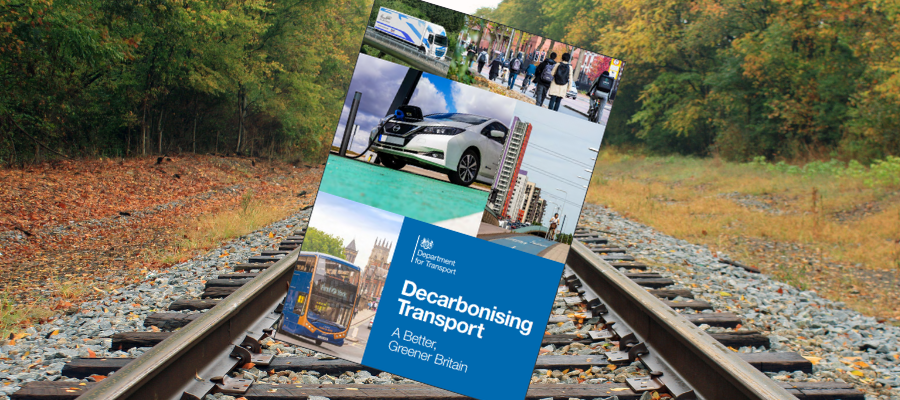🕒 Article read time: 2 minutes
Keeping the decarbonisation of rail on track

As reported in last week’s Logistics Magazine, the Department for Transport (DfT) published a commitment in its Transport Decarbonisation Plan (TDP) last month to make the rail network net zero by 2050, an aim supported by Logistics UK and its members.
It also published policies to incentivise the take up of low carbon traction by rail freight operators along the way and revealed ambitions to remove all diesel-only trains – both passenger and freight – from the network by 2040.
ONE PER CENT OF TRANSPORT EMISSIONS
Accounting for around 1% of domestic GHG emissions by transport mode in 2019, rail has a significant role to play in zero carbon transport as the country moves towards its net zero goal. As stated in the TDP, rail is currently the only means of transporting heavy goods in a low-carbon way using existing, proven technology through electrification. In the last three years, DfT has completed almost 700 track miles of electrification across England and Wales, and with almost 38% of the network now electrified, rail is currently the greenest form of motorised transport. Furthermore, according to the TDP, electric locomotives cost less to operate and could also reduce journey times as electric traction provides quicker speeds and better reliability than diesel fuelled services.
ELECTRIFICATION PROGRAMME
Logistics UK has consistently urged government to begin a rolling programme of electrification to help deliver net-zero ambitions, as well as support further private sector investment and has previously explained how electrifying short gaps in the network would join routes up and immediately support an increase in the use of electric traction. The business group is delighted that the TDP notes further electrification projects are to be announced shortly and also mentions how infill electrification projects could deliver benefits quickly.
CAPACITY CRUNCH
While the rail sector’s role in achieving the UK’s decarbonisation targets is vital, currently, capacity for freight services is severely constrained. Logistics UK welcomes the introduction of a rail freight growth target – as initially mentioned in the Williams-Shapps Plan for Rail and reinforced in the TDP – to encourage growth of the sector and increase the modal shift from road to rail, leading to a reduction in GHG emissions. Each freight train is able to remove up to 76 HGVs off the UK’s roads, with rail freight currently removing around six and a half million lorries from the road each year. Furthermore, moving goods by rail, using diesel locomotives, currently saves 76% carbon per freight tonne mile compared to using road. And, as electric freight trains produce 60% less carbon emissions than diesel trains, their use could result in a 90% carbon saving per freight tonne mile, compared to road. It is also reassuring to note that DfT is looking to electrify gaps to key ports and terminals, which will further encourage a greater modal shift.
SUPPORTING THE SHIFT FROM ROAD TO RAIL
Furthermore, government has noted within the TDP that building extra capacity on our rail network to meet growing passenger and freight demand will also support significant shifts from road to rail, further improving a reduction in GHG emissions. A clear example of this is HS2, which has the capacity to free up space on the existing rail network for up to 144 extra freight trains per day.
ALTERNATIVES TO ELECTRIFICATION
While electrification is vital, alternative traction power – such as battery and hydrogen trains – will also play a key role in less used parts of the network, due to the high cost of installing electrification. Technology is progressing rapidly; in September 2020, Britain’s first hydrogen powered train made its debut journey, with aims for it to begin carrying passengers by the end of 2021. It will, however, be interesting to see how suitable these technologies will be for heavier freight trains, or whether their use will be focused for passenger travel.
POLICY STATEMENT WELCOMED
Published alongside the TDP was DfT’s The Rail Environment Policy Statement: on Track for a Cleaner, Greener Railway. This document further details government’s direction for the rail industry on environmental sustainability and recognises that for rail to be truly Net Zero, any fuels used across the network must be sourced renewably and any associated infrastructure, such as depots, stations and terminals, must also be zero emission, a view that is mirrored by Logistics UK.
Alex Veitch, General Manager – Public Policy, Logistics UK, said: “This policy statement, along with government’s Transport Decarbonisation Plan, provides the clarity and certainty industry needs. Logistics UK supports the publication of these documents and recognises the important role rail plays in the decarbonisation of transport. We look forward to continuing our work with government, and members, to ensure the sector’s successful decarbonisation by 2050.”
*www.logistics.org.uk/rail
Published On: 05/08/2021 16:00:32

Comments Section
If you are a Logistics UK member login to add comments.